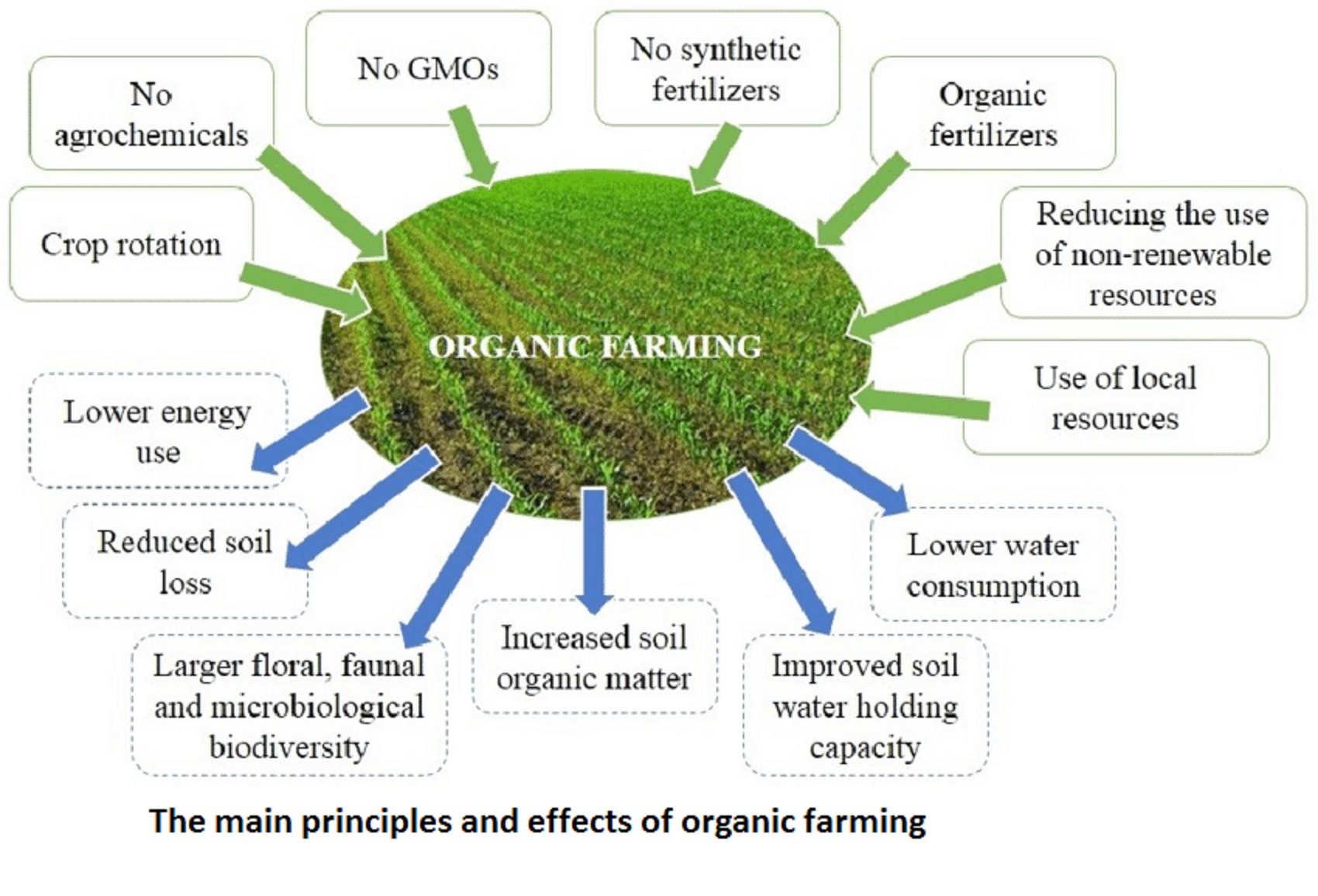Natural food refers to food products that are derived from nature and undergo minimal processing or alteration before reaching consumers. It is characterized by its purity and lack of artificial additives, synthetic chemicals, or genetic modifications. Natural foods are typically sourced from organic or sustainable farming practices and are often considered healthier options due to their higher nutrient content and absence of potentially harmful substances.

The number of certified organic farms in the United States increased by 5% to reach 17,445. California maintained its position as the top state in terms of certified organic sales, accounting for 32% of the national total with $3.55 billion. Additionally, California had the highest number of certified farms at 3,061 and the most certified acres.
Why Natural Food?
Consuming natural food provides multiple advantages that contribute to one’s overall health and well–being. Here are some key advantages of consuming natural foods:
- Nutrient-rich: Natural foods tend to be rich in essential nutrients such as vitamins, minerals, antioxidants, and dietary fiber. These nutrients support various bodily functions, promote optimal health, and help prevent chronic diseases.
- Lower chemical exposure: Natural foods are produced using organic or sustainable farming practices, minimizing the use of synthetic pesticides, herbicides, and fertilizers. This reduces the exposure to potentially harmful chemicals and promotes a cleaner food supply.
- Improved digestion: Incorporating natural foods into one’s diet, especially whole grains, fruits, vegetables and high–fiber foods promote the maintenance of a healthy digestive system. They provide dietary fiber, which aids in digestion, regulates bowel movements, and promotes gut health.
- Enhanced taste and flavor: Natural foods often have a more authentic and robust taste compared to processed or artificially flavored foods. The natural flavors and textures of fresh fruits, vegetables, and other unprocessed foods can be more enjoyable and satisfying.
- Sustainable and eco-friendly: Choosing natural foods supports sustainable and eco-friendly agricultural practices. Adopting organic farming techniques minimizes soil and water pollution, preserves biodiversity and supports the well–being of eco–systems.
- Allergen-free options: Natural foods can provide alternatives for individuals with specific dietary needs or allergies. Numerous natural foods naturally lack gluten, dairy or common allergens making them suitable options for individuals with dietary restrictions to find alternatives.
- Long-term health benefits: Consistently incorporating natural foods into a balanced diet can contribute to long-term health benefits, such as reduced risk of obesity, heart disease, diabetes, and certain types of cancer.
Types of Natural Food
Natural foods encompass a wide variety of options that are minimally processed and derived from nature. Here are some common types of natural foods:
- Fruits: Fresh fruits like apples, oranges, bananas, berries, and melons are excellent sources of vitamins, minerals, and antioxidants.
- Vegetables: Leafy greens, broccoli, carrots, peppers, tomatoes, and cucumbers are examples of nutrient-dense vegetables that provide essential vitamins, minerals, and dietary fiber.
- Whole Grains: Whole grains include foods like quinoa, brown rice, oats, whole wheat bread, and whole grain pasta. They retain their natural fiber, vitamins, and minerals compared to refined grains.
- Legumes: Beans, lentils, chickpeas, and peas are nutrient-packed legumes that offer protein, dietary fiber, and various vitamins and minerals.
- Nuts and Seeds: Almonds, walnuts, flaxseeds, chia seeds, and pumpkin seeds are nutrient-dense options rich in healthy fats, protein, fiber, and essential nutrients.
- Lean Meats and Poultry: Minimally processed, unseasoned meats and poultry, such as grass-fed beef, organic chicken, and turkey, can be part of a natural food diet, providing high-quality protein and essential nutrients.
- Fish and Seafood: Wild-caught fish like salmon, tuna, sardines, and mackerel are rich in omega-3 fatty acids, protein, and various nutrients.
- Dairy and Dairy Alternatives: Consumers have the option to consume natural dairy products such as plain yogurt, cottage cheese and organic milk or opt for dairy alternatives like almond milk, coconut milk and soy milk.
- Herbs and Spices: Natural herbs and spices, such as basil, oregano, turmeric, cinnamon, and ginger, add flavor to dishes without artificial additives.
Nutritional Value of Natural Food
Natural foods are renowned for their exceptional nutritional value, as they undergo minimal processing and are typically abundant in vital nutrients. Here are some key benefits and nutrients found in natural foods:
- Fiber: Many natural foods are excellent sources of dietary fiber, including fruits, vegetables, whole grains, legumes, and seeds. Fiber aids in digestion, promotes healthy bowel movements, and helps control blood sugar levels and cholesterol levels.
- Antioxidants: Natural foods are often abundant in antioxidants, which help protect the body against oxidative stress and damage caused by harmful free radicals. Examples of natural foods high in antioxidants include berries, leafy greens, nuts, and colorful vegetables.
- Healthy Fats: Certain natural foods, such as avocados, nuts, seeds, and oily fish provide healthy fats like omega-3 fatty acids. These fats support brain health, reduce inflammation, and promote heart health.
- Protein: Natural foods like lean meats, poultry, fish, eggs, legumes, and dairy products are good sources of protein. Protein plays a vital role in tissue building and repair promoting muscle growth and sustaining a robust immune system.
- Phytochemicals: Natural foods often contain photochemical, which are plant compounds that have various health benefits. These include flavonoids, carotenoids, and polyphenols found in fruits, vegetables, and herbs. Phytonutrients have antioxidant, anti-inflammatory, and immune-boosting properties.
- Lower Additives and Preservatives: Natural foods are generally free from artificial additives, preservatives, and synthetic ingredients that are commonly found in processed foods. This reduces the intake of potentially harmful substances and supports a more wholesome and natural diet.
- Micronutrient Adequacy: A diverse and balanced diet that includes natural foods like fruits, vegetables, whole grains, nuts, and seeds is essential for obtaining essential vitamins and minerals. These micronutrients, such as vitamin C, vitamin A, potassium, magnesium, and iron, are crucial for maintaining overall health and supporting various bodily functions, including metabolism, immune function, and tissue repair.
Availability of Natural Food
Natural foods are widely available in various places, including:
- Grocery Stores: Most grocery stores have dedicated sections for natural foods, including fresh produce, organic products, whole grains, and minimally processed items.
- Farmers’ Markets: Farmers’ markets are great sources of natural foods as they offer locally grown and seasonal produce, often with organic options. These markets provide an opportunity to directly connect with local farmers and learn more about the origin of the food.
- Health Food Stores: Specialty health food stores focus on providing a wide range of natural and organic products, including fresh produce, natural snacks, bulk foods, and specialty items catering to specific dietary needs.
- Online Retailers: Many online platforms and retailers specialize in natural and organic foods. They provide means to conveniently access a diverse range of natural food products and have them delivered directly to your home.
- Community Supported Agriculture (CSA): CSA programs allow consumers to purchase shares or subscriptions directly from local farmers. Members receive regular deliveries of fresh, locally grown produce and sometimes other farm products, supporting sustainable agriculture and ensuring access to natural foods.
- Co-operatives: Food co-operatives or co-ops are member-owned grocery stores that prioritize natural, organic, and locally sourced foods. These community-focused stores offer a range of natural food options.
- Home Gardens: Growing your own food through a home garden allows you to have direct control over the cultivation process, ensuring the use of natural and organic practices. It can be a rewarding way to access fresh, homegrown produce.
Regulations on Natural Food
Regulations on natural food vary by country and jurisdiction. In many regions, including the United States, there is no official definition or regulatory standard for the term “natural” when used on food labels. However, there are regulations in place for organic food, which is often associated with natural food.
Organic food is regulated by various certification bodies and government agencies that set standards for organic farming practices, including the use of natural fertilizers, pest control methods, and the avoidance of synthetic chemicals. These standards typically prohibit the use of genetically modified organisms (GMOs) and require the use of organic seeds, sustainable farming practices, and animal welfare standards.
Food labeling regulations may also require manufacturers to disclose specific information about the ingredients, processing methods, and additives used in their products. This helps consumers make informed choices and understand the composition of the food they are purchasing. Nutritional information, ingredients list, and allergen warnings are important food label information when buying a food.
It’s important to note that the term “natural” on food labels can be subjective and open to interpretation. Some companies may use the term loosely to imply that their products are minimally processed or free from certain additives, while others may have their own internal standards for what they consider natural.
Consumers interested in natural food can look for additional certifications and labels, such as USDA Organic, Non-GMO Project Verified, or other third-party certifications that provide more specific guidelines and assurance of natural and organic practices. Reading ingredient lists and understanding the sourcing and processing methods can also help in determining the natural qualities of a food product.
Artificial Additives vs. Natural Foods: Understanding the Difference
Artificial additives, such as artificial colors, are commonly used to enhance the appearance of food products. For instance, food dyes may be added to give vibrant colors to candies or beverages. Flavor enhancers like artificial flavors are often used to provide specific tastes that may not occur naturally in a food product. For example, artificial vanilla flavoring can be added to ice cream. Preservatives, such as artificial preservatives, are used to extend the shelf life of processed foods. For instance, sodium benzoate is a commonly used preservative in various food products to prevent spoilage. Artificial sweeteners, like aspartame or sucralose, are often used as sugar substitutes in diet sodas or low-calorie products.

On the other hand, natural foods are minimally processed or unprocessed and do not contain artificial additives. Examples include fresh fruits and vegetables, whole grains like quinoa or brown rice, lean proteins such as chicken or tofu, and natural sources of fats like avocados or nuts.
Choosing natural foods over those with artificial additives can be beneficial for health as they provide essential nutrients without the potential risks associated with artificial additives. Natural food is often fresher than processed food because it undergoes minimal processing and has not been stored for extended periods on shelves. Natural foods, such as fresh fruits, vegetables, and meats, are typically consumed closer to their harvest or preparation date, which helps retain their nutritional value, flavor, and texture. In contrast, processed foods often contain additives and undergo various preservation methods, such as freezing or canning, which can affect their freshness and nutrient content over time. Choosing fresh, natural foods can contribute to a more nutrient-rich and flavorful diet.
Common FAQs on Natural Food
Can natural food help with weight loss?
Yes, natural foods can aid in weight loss due to their nutrient density and lower calorie content compared to processed foods. They can help promote satiety, provide essential nutrients, and support overall health while managing weight.
Is natural food more expensive than processed alternatives?
In general, natural foods tend to be slightly more expensive than processed alternatives due to higher production costs, organic farming practices, and limited availability. However, the price difference can vary depending on various factors, including the region, seasonality, and specific food items.
Can natural food help prevent certain diseases or health conditions?
Yes, natural foods, rich in nutrients and antioxidants, can help prevent certain diseases and promote better health by supporting immune function, reducing inflammation, and providing essential vitamins and minerals. However, individual factors and overall lifestyle choices also play a crucial role in disease prevention.
What are some natural foods that are beneficial for bodybuilding and workouts?
Natural foods beneficial for bodybuilding and workouts include lean proteins like chicken, fish, tofu, and Greek yogurt; complex carbohydrates such as quinoa, brown rice, and sweet potatoes; healthy fats from sources like avocados, nuts, and olive oil; and a variety of fruits and vegetables for vitamins, minerals, and antioxidants.
How can I differentiate between genuinely natural food and misleading marketing claims?
Differentiate between genuinely natural food and misleading marketing claims by reading ingredient labels, looking for trusted certifications like USDA Organic, and being cautious of exaggerated health claims or vague terminology like “natural” that is not regulated.
How much protein should I consume from natural food sources?
Protein intake from natural food sources varies based on factors like age, sex, activity level. A general guideline is 0.8g/kg body weight, but it may increase for intense workouts; consult a healthcare professional for personalized advice.
What are some natural food alternatives to sports drinks or energy gels for fueling workouts?
Coconut water is a natural alternative to sports drinks, providing electrolytes and hydration without added sugars or artificial ingredients. Dates or honey can serve as natural sources of energy for sustained fuel during workouts, offering carbohydrates and nutrients without the additives found in energy gels.
What are the demerits of natural foods?
Limited Shelf Life: Natural foods, especially fresh fruits and vegetables, have a shorter shelf life compared to processed foods, which can lead to food waste if not consumed in a timely manner.
Seasonal Availability: Some natural foods may have limited availability during certain seasons, making it challenging to maintain a consistent diet throughout the year.









